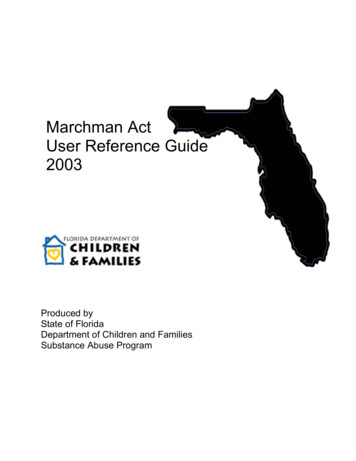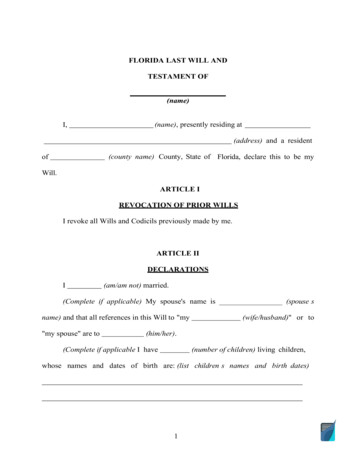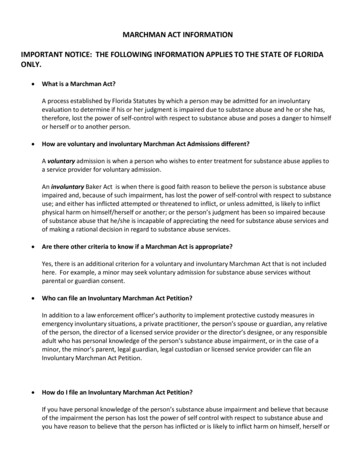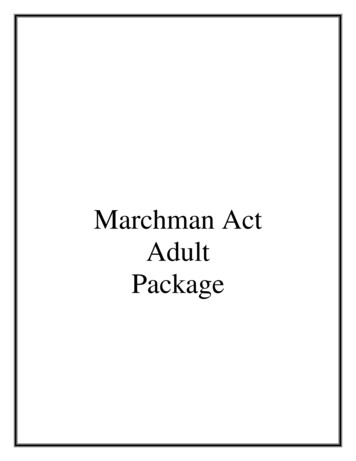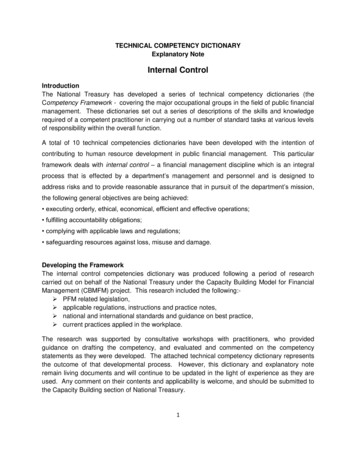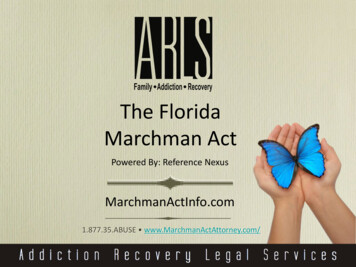
Transcription
The FloridaMarchman ActPowered By: Reference NexusMarchmanActInfo.com1.877.35.ABUSE www.MarchmanActAttorney.com/
History of the Marchman ActPrior to October 1, 1993 substance abuse wasaddressed by two statutes: 1. Chapter 396—the Myers Act which concernedalcoholism; and, 2. Chapter 397—the Mahan Act which concerned drugdependency1.877.35.ABUSE www.MarchmanActAttorney.com
The new Chapter 397, the Hal S. Marchman Alcohol andOther Drug Services Act of 1993, known as theMarchman Act, superseded both statutes as of October1, 1993.1.877.35.ABUSE www.MarchmanActAttorney.com
Part I: GENERAL PROVISIONS (ss. 397.301-397.334)Part II: SERVICE PROVIDERS (ss. 397.401-397.4873)Part III: CLIENT RIGHTS (ss. 397.501-397.581)Part IV: VOLUNTARY ADMISSIONS PROCEDURES (s. 397.601)Part V: INVOLUNTARY ADMISSIONS PROCEDURES (ss. 397.675397.6978)Part VI: LOCAL ORDINANCE PROHIBITION ANDAUTHORIZATION; ADMISSIONSPart VII: OFFENDER REFERRALS (ss. 397.705, 397.706)Part VIII:INMATE SUBSTANCE ABUSE PROGRAMS (ss. 397.752397.754)Part IX: CHILDREN'S SUBSTANCE ABUSE SERVICES (ss. 397.92397.998)1.877.35.ABUSE www.MarchmanActAttorney.com
“The Marchman Act”PART VINVOLUNTARY ADMISSIONS PROCEDURES(ss. 397.675-397.6978)1.877.35.ABUSE www.MarchmanActAttorney.com
Admissions Involuntary Admissions There are 2 types of Involuntary Admissions: Non-Court Involved Admissions Court-Involved Admissions1.877.35.ABUSE www.MarchmanActAttorney.com
Categories of Non-Court Involved AdmissionsThere are 3 categories of Non-Court Involved Admissions:1. Protective Custody (s.s.397.677-6775); theseProvisions pertain to law enforcement;2. Emergency Admissions (s.s.397.679-6797); these provisionpertain to medical personnel; and,3. Alternative Involuntary Assessment for a Minor(s.s.397.6789-6799); these provisions allow a parent,legal guardian, or legal custodian to bring a minor toa facility for an assessment.1.877.35.ABUSE www.MarchmanActAttorney.com
Protective Custody397.677. Protective custody; circumstances justifying.A law enforcement officer may implement protective custodymeasures as specified in this part when a minor or an adult whoappears to meet the involuntary admission criteria in s. 397.675 is:(1) Brought to the attention of law enforcement; or(2) In a public place.397.6771. Protective custody with consent.A person in circumstances which justify protective custody, asdescribed in s. 397.677, may consent to be assisted by a lawenforcement officer to his or her home, to a hospital, or to alicensed detoxification or addictions receiving facility,whichever the officer determines is most appropriate.1.877.35.ABUSE www.MarchmanActAttorney.com
Protective Custody continued 397.6772. Protective custody without consent(1) If a person in circumstances which justify protective custody asdescribed in s. 397.677 fails or refuses to consent to assistance anda law enforcement officer has determined that a hospital or alicensed detoxification or addictions receiving facility is the mostappropriate place for the person, the officer may, after giving dueconsideration to the expressed wishes of the person:(a) Take the person to a hospital or to a licensed detoxification oraddictions receiving facility against the person's will but withoutusing unreasonable force; or(b) In the case of an adult, detain the person for his or her ownprotection in any municipal or county jail or other appropriatedetention facility.1.877.35.ABUSE www.MarchmanActAttorney.com
Protective Custody without consent continued Such detention is not to be considered an arrest for any purpose, and no entryor other record may be made to indicate that the person has been detained orcharged with any crime. The officer in charge of the detention facility mustnotify the nearest appropriate licensed service provider within the first 8hours after detention that the person has been detained. It is the duty of thedetention facility to arrange, as necessary, for transportation of the person toan appropriate licensed service provider with an available bed. Persons takeninto protective custody must be assessed by the attending physician within the72-hour period and without unnecessary delay, to determine the need forfurther services.397.311(25) “Licensed service provider” means a public agency under thischapter, a private for-profit or not-for-profit agency under this chapter, aphysician or any other private practitioner licensed under this chapter, or ahospital that offers substance abuse services through one or more licensedservice components.1.877.35.ABUSE www.MarchmanActAttorney.com
397.6773. Dispositional alternatives afterprotective custody(1) A client who is in protective custody must be released by a qualified professionalwhen:(a) The client no longer meets the involuntary admission criteria in s. 397.675(1);(b) The 72-hour period has elapsed; or(c) The client has consented to remain voluntarily at the licensed service provider.(2) A client may only be retained in protective custody beyond the 72-hourperiod when a petition for involuntary assessment or treatment has beeninitiated. The timely filing of the petition authorizes the service provider toretain physical custody of the client pending further order of the court .1.877.35.ABUSE www.MarchmanActAttorney.com
397.679. Emergency admission; circumstances justifyingA person who meets the criteria for involuntary admission in 397.675 may beadmitted to a hospital or to a licensed detoxification facility or addictionsreceiving facility for emergency assessment and stabilization, or to a lessintensive component of a licensed service provider for assessment only, uponreceipt by the facility of the physician's certificate and the completion of anapplication for emergency admission.397.6791. Emergency admission; persons who may initiateThe following persons may request an emergency admission:A physician, a clinical psychologist, a physician assistant working under the scope ofpractice of the supervising physician, a psychiatric nurse, an advanced registered nursepractitioner, a mental health counselor, a marriage and family therapist, a master’slevel-certified addictions professional for substance abuse services, or a clinical socialworker may execute a professional’s certificate for emergency admission.In the case of a minor, the minor's parent, legal guardian, or legal custodian.1.877.35.ABUSE www.MarchmanActAttorney.com
397.6797. Dispositional alternatives after emergencyadmissionWithin 72 hours after an emergency admission to a hospital or a licensed detoxificationor addictions receiving facility, the client must be assessed by the attending physicianto determine the need for further services. Within 5 days after an emergencyadmission to a nonresidential component of a licensed service provider, the client mustbe assessed by a qualified professional to determine the need for further services.Based upon that assessment, a qualified professional of the hospital, detoxificationfacility, or addictions receiving facility, or a qualified professional if a less restrictivecomponent was used, must either:(1) Release the client and, where appropriate, refer the client to other neededservices; or(2) Retain the client when:The client has consented to remain voluntarily at the licensed provider; orA petition for involuntary assessment or treatment has been initiated, the timelyfiling of which authorizes the service provider to retain physical custody of theclient pending further order of the court.1.877.35.ABUSE www.MarchmanActAttorney.com
397.6798. Alternative involuntary assessmentprocedure for minorsIn addition to protective custody, emergency admission, and involuntaryassessment and stabilization, an addictions receiving facility may admita minor for involuntary assessment and stabilization upon the filing of anapplication to an addictions receiving facility by the minor's parent,guardian, or legal custodian.“Addictions receiving facility” is a secure, acute care facility that provides, at aminimum, detoxification and stabilization services; is operated 24 hours per day,7 days per week; and is designated by the department to serve individualsfound to be substance use impaired as described in s. 397.675 who meet theplacement criteria for this component.1.877.35.ABUSE www.MarchmanActAttorney.com
Court Involved AdmissionsThere are 2 procedures concerning court involve admissions:1. Petitions for Involuntary Assessment and Stabilization(397.6811-6822); and2. Petitions for Involuntary Treatment(397.693-6978)1.877.35.ABUSE www.MarchmanActAttorney.com
Criteria for invoking aninvoluntary admission: The ‘heart’ of the ActSection 397.675 states:A person meets the criteria for involuntary admission if there is good faith reasonto believe that the person is substance abuse impaired or has a co-occurring mentalhealth disorder and, because of such impairment or disorder:(1) Has lost the power of self-control with respect to substance abuse; and(2)(a) Is in need of substance abuse services and, by reason of substance abuseimpairment, his or her judgment has been so impaired that he or she is incapableof appreciating his or her need for such services and of making a rational decisionin that regard, although mere refusal to receive such services does not constituteevidence of lack of judgment with respect to his or her need for such services; or(b) Without care or treatment, is likely to suffer from neglect or refuse to care forhimself or herself; that such neglect or refusal poses a real and present threat ofsubstantial harm to his or her well-being; and that it is not apparent that suchharm may be avoided through the help of willing family members or friends or theprovision of other services, or there is substantial likelihood that the person hasinflicted, or threatened to or attempted to inflict, or, unless admitted, is likely toinflict, physical harm on himself, herself, or another.1.877.35.ABUSE www.MarchmanActAttorney.com
Definition of “substance abuse impaired”391.311(19) “Impaired” or “substance abuseimpaired” means a condition involving the use ofalcoholic beverages or any psychoactive ormood-altering substance in such a manner as toinduce mental, emotional, or physical problemsand cause socially dysfunctional behavior.1.877.35.ABUSE www.MarchmanActAttorney.com
Some important definitions 397.311(46) “Substance abuse” means the misuseor abuse of, or dependence on alcohol, illicit drugs, orprescription medications. As an individual progressesalong this continuum of misuse, abuse, anddependence, there is an increased need for substanceabuse intervention and treatment to help abate theproblem. 397.311(43)“Service provider” or “provider”means a public agency, a private for-profit or not-forprofit agency, a person who is a private practitioner, ora hospital licensed under this chapter or exempt fromlicensure under this chapter.1.877.35.ABUSE www.MarchmanActAttorney.com
Court Involved Proceedings Only the circuit court has jurisdiction to determine matterunder the Act. Petitions are filed in the county where the person in located.(Please note: this does not mean where the person resides). Magistrates are specifically authorized to preside overMarchman Act matters. A Respondent has the right to counsel and has the right tohave one appointed if qualified under 57.081(indigence status).1.877.35.ABUSE www.MarchmanActAttorney.com
397.6811 Involuntary assessment and stabilization.A person determined by the court to appear to meet the criteria for involuntary admissionunder s. 397.675 may be admitted for a period of 5 days (or longer) to a hospital or to alicensed detoxification facility or addictions receiving facility, for involuntary assessment andstabilization upon entry of a court order or upon receipt by the licensed service provider of apetition. Involuntary assessment and stabilization may be initiated by the submission of apetition to the court.(1) If the person upon whose behalf the petition is being filed is an adult, a petition forinvoluntary assessment and stabilization may be filed by the respondent’s spouse or legalguardian, any relative, a private practitioner, the director of a licensed service provider or thedirector’s designee, or an adult who has direct personal knowledge of the respondent’ssubstance abuse impairment.(2) If the person upon whose behalf the petition is being filed is a minor, a petition forinvoluntary assessment and stabilization may be filed by a parent, legal guardian, legalcustodian, or licensed service provider.1.877.35.ABUSE www.MarchmanActAttorney.com
397.6814Involuntary assessment and stabilization; contents of petition.397.6814 Involuntary assessment and stabilization; contents of petition.—A petition for involuntaryassessment and stabilization must contain the name of the respondent, the name of the applicant orapplicants, the relationship between the respondent and the applicant, and the name of therespondent’s attorney, if known, and must state facts to support the need for involuntary assessmentand stabilization, including:(1)The reason for the petitioner’s belief that the respondent is substance abuse impaired;(2) The reason for the petitioner’s belief that because of such impairment the respondent has lostthe power of self-control with respect to substance abuse; and(3)(a) The reason the petitioner believes that the respondent has inflicted or is likely to inflictphysical harm on himself or herself or others unless admitted; or(b) The reason the petitioner believes that the respondent’s refusal to voluntarily receive care isbased on judgment so impaired by reason of substance abuse that the respondent is incapable ofappreciating his or her need for care and of making a rational decision regarding that need for care. Ifthe respondent has refused to submit to an assessment, such refusal must be alleged in the petition.1.877.35.ABUSE www.MarchmanActAttorney.com
397.6815Involuntary assessment and stabilization; procedure.397.6815 Involuntary assessment and stabilization; procedure.—Upon receipt and filingof the petition for the involuntary assessment and stabilization of a substance abuseimpaired person by the clerk of the court, the court shall ascertain whether therespondent is represented by an attorney, and if not, whether, on the basis of the petition,an attorney should be appointed; and shall:(1) Provide a copy of the petition and notice of hearing to the respondent; therespondent’s parent, guardian, or legal custodian, in the case of a minor; the respondent’sattorney, if known; the petitioner; the respondent’s spouse or guardian, if applicable; andsuch other persons as the court may direct, and have such petition and notice personallydelivered to the respondent if he or she is a minor. The court shall also issue a summonsto the person whose admission is sought and conduct a hearing within 10 days; or(2) Without the appointment of an attorney and, relying solely on the contents of thepetition, enter an ex parte order authorizing the involuntary assessment andstabilization of the respondent. The court may order a law enforcement officer or otherdesignated agent of the court to take the respondent into custody and deliver him or herto the nearest appropriate licensed service provider.1.877.35.ABUSE www.MarchmanActAttorney.com
397.6818Court determination.At the hearing initiated in accordance with s. 397.6811(1), the court shall hear all relevanttestimony. The respondent must be present unless the court has reason to believe that his or herpresence is likely to be injurious to him or her, in which event the court shall appoint a guardianadvocate to represent the respondent. The respondent has the right to examination by a courtappointed qualified professional. After hearing all the evidence, the court shall determinewhether there is a reasonable basis to believe the respondent meets the involuntary admissioncriteria of s. 397.675.(1) Based on its determination, the court shall either dismiss the petition or immediately enteran order authorizing the involuntary assessment and stabilization of the respondent; or, if in thecourse of the hearing the court has reason to believe that the respondent, due to mental illnessother than or in addition to substance abuse impairment, is likely to injure himself or herself oranother if allowed to remain at liberty, the court may initiate involuntary proceedings under theprovisions of part I of chapter 394.1.877.35.ABUSE www.MarchmanActAttorney.com
397.6818 Court determination continued (2) If the court enters an order authorizing involuntary assessment and stabilization, the ordershall include the court’s findings with respect to the availability and appropriateness of the leastrestrictive alternatives and the need for the appointment of an attorney to represent therespondent, and may designate the specific licensed service provider to perform the involuntaryassessment and stabilization of the respondent. The respondent may choose the licensed serviceprovider to deliver the involuntary assessment where possible and appropriate.(3) If the court finds it necessary, it may order the sheriff to take the respondent into custodyand deliver him or her to the licensed service provider specified in the court order or, if none isspecified, to the nearest appropriate licensed service provider for involuntary assessment.(4) The order is valid only for the period specified in the order or, if a period is not specified, for7 days after the order is signed.1.877.35.ABUSE www.MarchmanActAttorney.com
397.6821 Extension of time for completion of involuntary assessment andstabilization.If a licensed service provider is unable to complete the involuntary assessment and, ifnecessary, stabilization of an individual within 5 days after the court’s order, it may,within the original time period, file a written request for an extension of time tocomplete its assessment, and shall, in accordance with confidentiality requirements,furnish a copy to all parties. With or without a hearing, the court may grant additionaltime, not to exceed 7 days after the date of the renewal order, for the completion ofthe involuntary assessment and stabilization of the individual. The original court orderauthorizing the involuntary assessment and stabilization, or a request for an extensionof time to complete the assessment and stabilization that is timely filed pursuant tothis section, constitutes legal authority to involuntarily hold the individual for a periodnot to exceed 10 days in the absence of a court order to the contrary.1.877.35.ABUSE www.MarchmanActAttorney.com
397.6822Disposition of individual after involuntary assessment.Based upon the involuntary assessment, a qualified professional of the hospital, detoxificationfacility, or addictions receiving facility, or a qualified professional when a less restrictivecomponent has been used, must:(1) Release the individual and, where appropriate, refer the individual to another treatmentfacility or service provider, or to community services;(2)Allow the individual, with consent, to remain voluntarily at the licensed provider; or(3) Retain the individual when a petition for involuntary treatment has been initiated, thetimely filing of which authorizes the service provider to retain physical custody of theindividual pending further order of the court.Adhering to federal confidentiality regulations, notice of disposition must be provided to thepetitioner and to the court.1.877.35.ABUSE www.MarchmanActAttorney.com
Responsibility of LSP uponadmission for assessment 397.6819A licensed service provider may admit an individual for involuntary assessment andstabilization for a period not to exceed 5 days unless a petition for involuntaryservices has been initiated and the individual is being retained pursuant to s.397.6822(3) or a request for an extension of time has been filed with the courtpursuant to s. 397.6821. The assessment of the individual must occur within 72hours by a qualified professional. If an assessment is performed by a qualifiedprofessional who is not a physician, the assessment must be reviewed by a physicianbefore the end of the assessment period.1.877.35.ABUSE www.MarchmanActAttorney.com
Petitions for Involuntary TreatmentUnder 397.693, a person maybe the subject of a treatment petition if the person meets thecriteria of 397.675 and has been:(1) Has been placed under protective custody pursuant to s. 397.677 within the previous10 days;(2) Has been subject to an emergency admission pursuant to s. 397.679 within theprevious 10 days;(3)Has been assessed by a qualified professional within 5 days;(4) Has been subject to involuntary assessment and stabilization pursuant to s. 397.6818within the previous 12 days; or(5) Has been subject to alternative involuntary admissionpursuant to s. 397.6822 within the previous 12 days.1.877.35.ABUSE www.MarchmanActAttorney.com
Petitions for Involuntary Treatment continued 397.695 Involuntary services; persons who may petition.(1) If the respondent is an adult, a petition for involuntary services may befiled by the respondent’s spouse or legal guardian, any relative, a serviceprovider, or an adult who has direct personal knowledge of the respondent’ssubstance abuse impairment and his or her prior course of assessment andtreatment.(2) If the respondent is a minor, a petition for involuntary treatment may befiled by a parent, legal guardian, or service provider.1.877.35.ABUSE www.MarchmanActAttorney.com
Treatment Orders The respondent may be ordered to undergo treatment for an initialperiod of “not to exceed” 90 days. The order may direct law enforcement to deliver the respondent to theLSP, if specified and, if not, then to the nearest LSP. After entry of a treatment order the court retains jurisdiction over thecase and the parties to enter further orders as circumstance may require. A treatment order authorizes the LSP to require the respondent toundergo appropriate treatment at any licensable component of the LSP.1.877.35.ABUSE www.MarchmanActAttorney.com
Treatment Orders continued Only the facility determines the type of treatment arespondent is to receive, e.g. outpatient orresidential, not the court. The court determines only who should be subject toinvoluntary orders.1.877.35.ABUSE www.MarchmanActAttorney.com
Extending Treatment Orders397.6975 When the LSP determines a client shouldremain in treatment past the period set forth ina treatment order, a petition seeking renewal ofthe treatment order may be filed at least 10days prior to the end of the treatment period. Ahearing is to be held on the request within 15days after it is filed.1.877.35.ABUSE www.MarchmanActAttorney.com
Extending Treatment Orders continued If extension is granted, an order may beentered extending treatment not to exceed anadditional 90 days, The respondent may bereleased from said order early pursuant397.6971. An additional petition to extend may be filedwhen justified by condition during the initial 90day extension period.1.877.35.ABUSE www.MarchmanActAttorney.com
Automatic DischargeA respondent is automatically discharged,and the court loses jurisdiction over theperson of the Respondent, uponcompletion of the original treatment periodif no petition to extend is filed. Also whenthe respondent no longer meets MarchmanAct criteria.1.877.35.ABUSE www.MarchmanActAttorney.com
Enforcement of Orders When there has been non-compliancewith a court order, the usual method forenforcing the order is through thecontempt power of the court.1.877.35.ABUSE www.MarchmanActAttorney.com
Enforcement of Orders continued A person found to be in civil contemptmay have a term of incarceration imposed,but must also be given a purge provision.The purge provision allows the person toperform some act in order to avoid beingincarcerated.1.877.35.ABUSE www.MarchmanActAttorney.com
397.501Rights of individualsIndividuals receiving substance abuse services from any service provider are guaranteed protectionof the rights specified in this section, unless otherwise expressly provided, and service providersmust ensure the protection of such rights.(1) RIGHT TO INDIVIDUAL DIGNITY(2) RIGHT TO NONDISCRIMINATORY SERVICES.—(a) Service providers who receive state funds to provide substance abuse services may not, if spaceand sufficient state resources are available, deny access to services based solely on inability to pay.(b) Each individual in treatment must be afforded the opportunity to participate in the formulationand periodic review of his or her individualized treatment or service plan to the extent of his or herability to so participate.(c) It is the policy of the state to use the least restrictive and most appropriate services available,based on the needs and the best interests of the individual and consistent with optimum care of theindividual1.877.35.ABUSE www.MarchmanActAttorney.com
(3) RIGHT TO QUALITY SERVICES.—(a) Each individual must be delivered services suited to his orher needs,(4) RIGHT TO COMMUNICATION(5) RIGHT TO CARE AND CUSTODY OF PERSONAL EFFECTS(6) RIGHT TO EDUCATION OF MINORS.—(7) RIGHT TO CONFIDENTIALITY OF INDIVIDUAL RECORDSUpon court order based on application showing good cause for disclosure. Indetermining whether there is good cause for disclosure, the court shall examinewhether the public interest and the need for disclosure outweigh the potentialinjury to the individual .(42 CFR Part 2 Confidentiality of Alcohol and Drug abuse Patient Records)1.877.35.ABUSE www.MarchmanActAttorney.com
(8) RIGHT TO COUNSEL.— Each individual must be informed that he or she has the right to berepresented by counsel in any involuntary proceeding for assessment, stabilization, or treatmentand that he or she, or if the individual is a minor his or her parent, legal guardian, or legalcustodian, may apply immediately to the court to have an attorney appointed if he or she cannotafford one.(9) RIGHT TO HABEAS CORPUS.— At any time, and without notice, an individual involuntarilyretained by a provider, or the individual’s parent, guardian, custodian, or attorney on behalf of theindividual, may petition for a writ of habeas corpus to question the cause and legality of suchretention and request that the court issue a writ for the individual’s release.(10) LIABILITY AND IMMUNITY.— (a) Service provider personnel who violate or abuse any rightor privilege of an individual under this chapter are liable for damages as determined by law.1.877.35.ABUSE www.MarchmanActAttorney.com
Addiction Recovery Legal ServicesPowered by: Reference chmanActInfo.com
The new Chapter 397, the Hal S. Marchman Alcohol and Other Drug Services Act of 1993, known as the Marchman Act, superseded both statutes as of October 1, 1993. 1.877.35.ABUSE www.MarchmanActAttorney.com Part I: GENERAL PROVISIONS (ss. 397.301-397.334) Part II: SERVICE PROVIDERS (ss. 397.401-397.4873) Part III:



